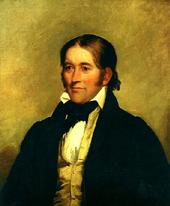David
David Crockett
David Crockett was born on August17th,1786 near the Nolichucky River in Greene County, Tennessee. According to Crockett's autobiography, his early years were filled with adventure, hardship, and traveling, even claiming (improbably) to have killed a bear at the age of 3. Shortly after being sent to school, he left home to avoid an unfair beating at the hands of his father, and spent several years roaming from town to town. During this period, Crockett claims to have visited most of the towns and villages throughout Tennessee and learned the majority of his skills as a backwoodsman, hunter and trapper. At 19, he retuned home, unannounced, and was welcomed back by his family.
Crockett married Polly Finley (1788-1815) on August 14, 1806, They had two boys: {Congressman} John Wesley Crockett was born July 10, 1807, followed by William (born 1809). They also had a daughter, Margaret. After Polly's death, David remarried in 1816 to a widow named Elizabeth Patton, and they had three children: Robert, Rebeckah and Matilda.
In 1813, during the Creek War, Crockett enlisted in the Second Regiment of Tennessee Volunteer Mounted Riflemen for ninety days and served under Colonel John Coffee and Andrew Jackson. He took an active part in the fighting, and was discharged from service on March 27, 1815. Later, in 1818, Crockett was elected lieutenant colonel of the Fifty-seventh Regiment of Tennessee Militia.
In 1826 and 1828, Crockett was elected to the United States House of Representatives. As a Congressman, Crockett supported the rights of squatters, who were barred from buying land in the West without already owning property. He also opposed President Andrew Jackson's Indian Removal Act, and his opposition to Jackson caused his defeat when he ran for re-election in 1831; however, he won when he ran again in 1833.
In 1834, his autobiography, titled A Narrative of the Life of David Crockett, was published. Crockett went east to promote the book and was narrowly defeated for re-election. In 1835, he suffered yet another defeat. He said, "I told the people of my district that I would serve them as faithfully as I had done; but if not ... you may all go to hell, and I will go to Texas". Following his defeat, he did just that.
In 1835, Crockett left Tennessee for Texas, writing "I want to explore Texas well before I return". He arrived in Nacogdoches, Texas, in early January 1836. On January 14, 1836 Crockett and 65 other men signed an oath before Judge John Forbes to the Provisional Government of Texas for six months. "I have taken the oath of government and have enrolled my name as a volunteer and will set out for the Rio Grande in a few days with the volunteers from the United States." Each man was promised about 4,600 acres of land as payment. On February 6, Crockett and about five other men rode into San Antonio de Bexar and camped just outside of the town. They were later greeted by James Bowie and Antonio Menchacha and taken to the home of Don Erasmo Seguin.
William Barret Travis was the commander in charge at the siege at the Alamo. He appealed for help against the Mexican forces, to which Davy Crockett responded. The Texas forces of 180-250 were overwhelmed by the attacking 1,300-1,600 Mexican soldiers. The Mexican commanders understood their superiority of numbers and position and offered free passage to all concerned. Travis, supported by his entire force except one, refused to surrender.
After a 13-day period in which Crockett and the other defenders were tormented with bands blaring at night (including buglers sounding the no-mercy call Èl Degüello, which literally translates into "slit throat") occasional artillery fire, and an ever closing ring of Mexicans cutting off potential escape routes, the Mexican forces (numbering from four to five thousand) attacked the Alamo. Though the defenders initially pushed back one of the attacking columns, the Mexicans breached the Alamo's weak north wall and quickly flooded into the fortress. The Alamo defenders were spread too thin to adequately defend both the walls and the invading Mexicans. By 8:00 that morning, nearly all of the Alamo defenders had been slain in brutal hand-to-hand combat. The battle, from the initial assault to the capture of the Alamo, lasted only an hour.
According to a Mexican report, a group of male survivors were executed after the battle. David Crockett was alleged to be among them. This claim is subject to controversy. The more common account of Crockett's fate was that he was killed in the final minutes of the siege, having fallen back to the Alamo's redoubt position of the long barracks with the last dozen or so of Travis' men. All that is known for certain about the fate of Davy Crockett is that he died at the Battle of the Alamo.
Most sources indicate Crockett and all the Alamo defenders were cremated en masse. On his tombstone, it says: "Davy Crockett, Pioneer, Patriot, Soldier, Trapper, Explorer, State Legislator, Congressman, Martyred at The Alamo.1786-1836".
Try the BEST MySpace Editor and MySpace Backgrounds at MySpace Toolbox !
